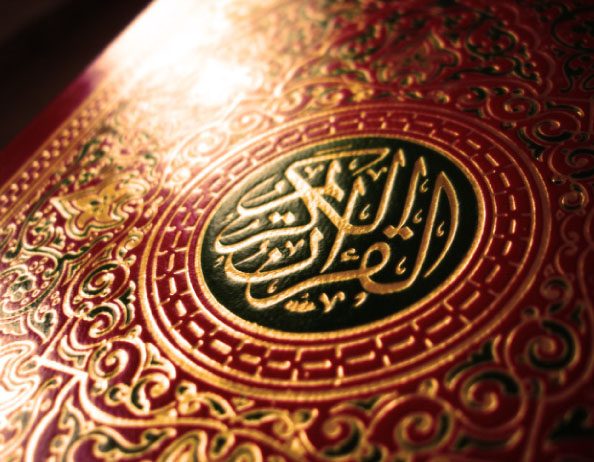
The Review of Religions is honoured to present the translation of Sūrah al-Nās, chapter 114 of the Holy Qur’an, from Hazrat Mirza Bashiruddin Mahmud Ahmad’s (ra) magnum opus, Al-Tafsīr Al-Kabīr.
In this instalment, Hazrat Mirza Bashiruddin Mahmud Ahmad (ra) explains how the verses of this chapter predicted the evil actions of western nations thousands of years in advance.
بِسْمِ اللَّهِ الرَّحْمَنِ الرَّحِيمِ
قُلْ أَعُوذُ بِرَبِّ النَّاسِ
مَلِكِ النَّاسِ * إِلَهِ النَّاسِ
By invoking the name of Allah, the Most Gracious, the Ever Merciful I recite.
We hereby instruct you: O ye Muslims of all times! Continue proclaiming unto others that seek refuge with the Lord of all mankind. And with He Who is the King of all of mankind and Who is also worshipped by all men. (2)
***
Commentary
(2) It has been explained in the commentary of Sūrah al-Lahab, that it mentions a nation that would emerge in the latter days that would attack and seek to exterminate Islam, the religion that the Holy Prophet (sa) brought to the world. The Ummah of Muhammad (sa) was taught the following prayer in order to protect them against the onslaughts of this nation in the last verse of Sūrah al-Falaq:
وَمِنْ شَرِّ حَاسِدٍ إِذَا حَسَدَ
[‘And from the evil of the mischievous one when he envies.’1]
And it mentioned that in the latter days, there would arise a jealous force of great power aiming not only to overthrow Islamic governments and seize their lands, but would also desire to completely eradicate Muslims from this world. Moreover, this envious nation would have all manners of material power and resources at its disposal, and due to the weakness and frailty of the Muslims, they would be unable to confront them. Therefore, in order to avoid this perilous trial, Allah Almighty has taught the Muslims this prayer to seek refuge in Him, not only so that He can create such means that protect Islam from the enemy’s onslaughts, but then so that its days of glory and splendour return after weakness.
Sūrah al-Nās begins by mentioning three divine attributes, and through them one is instructed to seek refuge with Allah. It states:
قُلْ أَعُوذُ بِرَبِّ النَّاسِ * مَلِكِ النَّاسِ * إِلَهِ النَّاسِ
meaning, ‘Proclaim, “O God, O Lord of mankind, we seek refuge in You. O King of all [mankind], we seek refuge in You. O God, Whom everyone worships, we seek refuge in You.”’
It is evident that when something is invoked in order to seek refuge from it, the actual purpose is to seek protection from that very thing; for instance, if we say, ‘Save us, O dog owner!’, it is clear that we are asking for protection from the dog. Or if we go to a place where someone is raising a lion and say, ‘O lion owner, run to me!’, it is clear that we are asking to be safeguarded from the lion. Thus, when we seek refuge with Rabb al-Nās [the Lord of mankind], Malik al-Nās [the King of mankind] and Ilāh al-Nās [the God of mankind], it is apparent that we seek protection against those particular attributes and characteristics of mankind relating and corresponding to Rubūbiyyah [divine providence], Malikiyyah [kingship] and Ulūhiyyah [divinity].
Mankind’s Rubūbiyyah manifests on this earth in the form of democracy, a system which also has certain flaws. The Mulūkiyyah [kingship or rule] of a nation is manifested in its power and authority over another country; this too comes with its flaws. The Ulūhiyyah of mankind appears in their general secular trends that emerge among a nonreligious nation, leading to the spreading of irreligiousness through countries that are less developed. It is self-evident that the attributes Rabb, Malik and Ilāh truly belong to God, and that when men acquire these attributes, they do so only by way of reflection [zill].
The command to seek refuge with the words Rabb al-Nās, Malik al-Nās, and Ilāh al-Nās foreshadows that mankind would bear afflictions relating to Rubūbiyyah, Malikiyyah, and Ulūhiyyah. In other words, some nations would exploit these attributes and cause harm to mankind, and especially to Muslims. Therefore, Allah Almighty reminds us here that He is the true Rabb [Lord] Malik [King] and Ilāh [God], so we should implore Him for help and succour through these three attributes, saying ‘O God, those whom You have created as a reflection of Rabb, Malik and Ilāh are [unjustly] exploiting these [powers], and instead of benefitting mankind they are harming them. So protect us from the Rubūbiyyah, Mulūkiyyah and Ulūhiyyah of such people.’
Now, if we observe the circumstances, we realise that Sūrah al-Nās gives a complete sketch of the Western nations. These are the envious people who cannot bear to see the Muslims in power and desire that the name of Islam should disappear altogether from this world. Therefore, we have been taught to pray in order to avoid the evils and mischiefs created by these nations. The prayer begins with the words: ‘I seek refuge with Rabb al-Nās [the Lord of mankind]. The attribute of Rubūbiyyah [providence] encompasses all such things that relate to the needs of man, or in other words refers to the nation’s economic system. That is, قُلْ أَعُوذُ بِرَبِّ النَّاسِ implies that when the envious nations emerge, first of all, they will destroy the economy of the Muslims and harm their trade and businesses. They will not begin by launching attacks on them with their armies; rather, their primary task will be to reach Muslim nations with their commercial resources, and open banks etc., there, thus seizing control of their economies first.
In fact, this was how European nations arrived in every part of the world; first they entered with their commercial goods, and slowly but surely seized control over their economies. They loaned money to Islamic nations and charged them interest, and thus continued to weaken their governments. In other words, they broke the system of divine providence that Islam established initially. So Allah Almighty has taught us the prayer قُلْ أَعُوذُ بِرَبِّ النَّاسِ to protect us against their evil mischiefs. In other words, if you wish to be saved from their evil, then take refuge with Allah Almighty.
After Rabb al-Nās, Allah has taught us the words Malik al-Nās. This foretells that after Western nations having wreaked havoc in the Islamic economies, the trial of monarchies [that is, domination by these powers] will then commence. Therefore, we observe that initially the Western nations entered other lands in the name of trade and commerce, but subsequently they established their own rule and governance within them. This is how they seized control over the Islamic empires including Egypt, Africa and India etc. Initially, they reached Africa with delicate bangles and rosary beads, and due to their shiny appearance, the credulous mistook them for valuable items, and they were obtained in exchange for gold and diamonds. Eventually these people colonised them. Similarly, they set up trade posts in places such as India, Iran, Arabia, Turkey etc. and wielded their influence. Their next step was to establish their own rule there, and thus they gained control over the Islamic political sphere.
The words Ilāh al-Nās have been placed after Malik al-Nās in order to tell us that after the Western nations have established their rule in various countries, another disorder would emerge from them, that is, they would begin spreading religious propaganda [against Islam], thereby shaking the faith of the Muslims. Moreover, they would seek to destroy religion by presenting new philosophy and new teachings, and through the education offered at colleges, would try to render the beliefs of Muslims to be meaningless. They would publish literature that makes Islam appear to be unreasonable, making people averse to it. Therefore, it is stated, ‘O Muslims! When you face such circumstances, you must seek refuge with Allah Who is your Lord, your King and your God.’ That is, you must pray that ‘O God! They intend to end the real Rubūbiyyah [providence], real Mulūkiyyah [kingship] and real Ulūhiyyah [divinity] which You seek to disseminate and spread throughout the world, thus create the means for their onslaughts to be eliminated so that Your true Rubūbiyyah, true Malikiyyah and true Ulūhiyyah may be established once again in the world.’
Serialisation of Surah al-Nās will continue in the subsequent editions
ENDNOTES
1.The Holy Qur’an, 113:6.




Add Comment